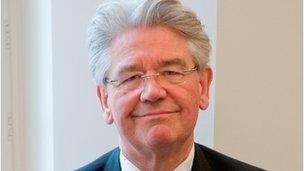UK Supreme Court judge Lord Wilson backs gay marriage
- Published

Lord Wilson said he wondered how long Northern Ireland could hold back the tide on gay marriage
A UK Supreme Court judge has made a strong case in favour of gay marriage.
Speaking at Queen's University, Belfast, he wondered how long Northern Ireland would "be able to hold back the tide in favour of same-sex marriages".
Northern Ireland is the only part of the United Kingdom where changes in the law are not being introduced.
Lord Wilson argued that to allow same-sex couples the right to marry strengthened rather than weakened marriage.
In England and Wales, the first same-sex marriages are due to take place at the end of March. The Scottish government passed a same-sex marriage bill earlier in February, with the first ceremonies expected before the end of the year.
At Stormont, the Democratic Unionist Party has twice tabled petitions of concern to effectively block votes about the subject at the NI Assembly, however they were not needed.
The party has indicated it will veto future bids to introduce legislation.
Lord Wilson of Culworth, a justice in the Supreme Court since 2011, was addressing the Northern Ireland Medico-Legal Society on Tuesday evening.
He said that, as an Englishman, he envied "the greater strength of traditional family values in Northern Ireland".
Lord Wilson said incorporating the European Convention on Human Rights into UK law had led to dramatic improvements for minority groups, like gay and trans-gender people.
Over 20 years, it had "raised our life together in this kingdom to a higher level of mutual respect," he said.
In his defence of marriage, Lord Wilson said that far from destroying it, allowing same-sex couples in, would strengthen it.
"The availability of marriage dignifies same-sex love," he said.
"In my view, the most important benefit of same-sex marriage is the symbol that it holds up to the heterosexual community, not forgetting teenagers apprehensively trying to make sense of their own emerging sexuality, that each of the two types of intimate adult love is as valid as the other.
"The availability of marriage properly dignifies same-sex love. To the question: 'Why should same-sex couples who can, as civil partners, already enjoy all relevant rights, be allowed to get married?' The proper response in my view is: 'Why shouldn't they?'"
The judge said that the availability of divorce had led to many re-marriages and, in their wake, many more step families and half-blood relationships.
What he termed "the blended family" had replaced "the nuclear family".
"I am not convinced it is a bad thing," he said. "Might it not be healthier for children to learn at a very early age to cope with relationships in a mixed and wider family group?"
- Published4 February 2014
- Published30 October 2013
- Published22 October 2013
- Published29 April 2013
- Published5 May 2013
- Published5 February 2013
- Published7 October 2013
- Published27 June 2013
- Published13 September 2013